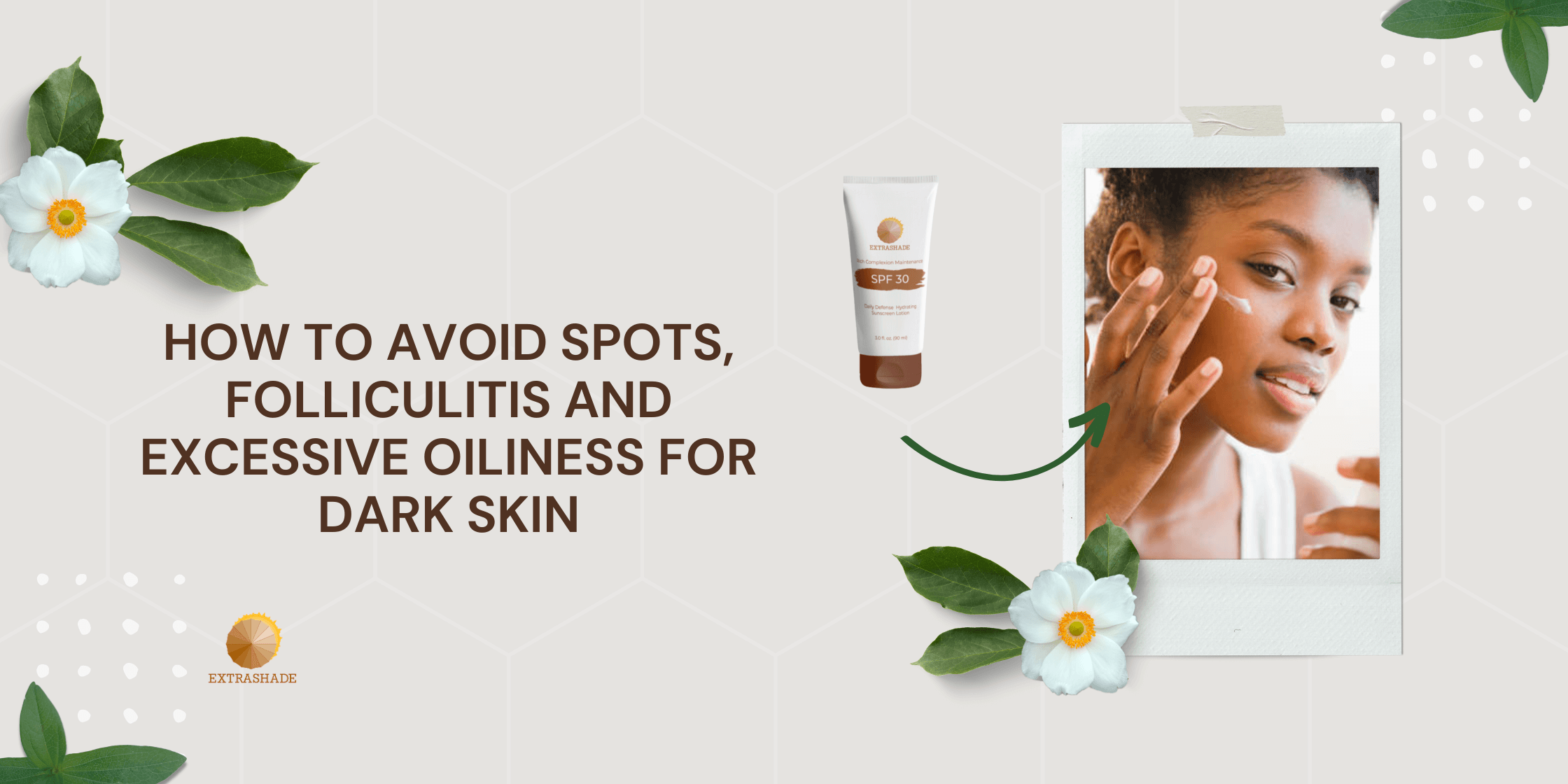Dark skin is beautiful and radiant, but it can also present unique skincare challenges. Breakouts, irritation, and unwanted shine can be frustrating. The good news? With the right approach, you can achieve a clear, balanced complexion that glows.
This guide will equip you with essential tips to combat spots (pimples), folliculitis (razor bumps), and excessive oiliness, all while keeping your dark skin healthy and vibrant.
So, without further ado, let’s dig deeper.
Importance of skincare for dark skin
Skincare is important for all skin tones, including dark skin. Here are some key points highlighting the importance of skincare specifically for dark skin.
1. Hyperpigmentation Management
Dark skin is more prone to hyperpigmentation, which can result from acne, eczema, or sun exposure. Proper skincare helps manage and prevent these dark spots and uneven skin tones.
2. Sun Protection
Despite having more melanin, dark skin still needs protection from UV radiation. Sun damage can lead to hyperpigmentation, premature aging, and increased risk of skin cancer. Using sunscreen is crucial.
3. Moisture Retention
Dark skin tends to lose moisture more quickly, leading to dryness and ashiness. Regular moisturizing helps maintain hydration, improve skin texture, and enhance the skin’s natural barrier function.
4. Even Skin Tone
A consistent skincare routine helps maintain an even skin tone. Cleansing, exfoliating, and moisturizing help remove dead skin cells and promote cell turnover, preventing dullness and promoting a radiant complexion.
5. Acne and Scarring
Dark skin can be more prone to certain types of acne, like papules and nodules, which can lead to post-inflammatory hyperpigmentation. Proper skincare helps prevent and treat acne, reducing the risk of scarring and dark spots.
6. Sensitivity to Irritants
Dark skin can be sensitive to certain ingredients, leading to irritation or allergic reactions. Using products formulated for dark skin helps avoid these issues and ensures that the skin remains healthy and resilient.
7. Aging Gracefully
While dark skin tends to age more slowly due to higher melanin levels, a good skincare routine helps maintain skin elasticity, reduce the appearance of fine lines and wrinkles, and keep the skin looking youthful.
8. Cultural and Personal Confidence
Taking care of one’s skin can boost self-esteem and confidence. Healthy, glowing skin contributes to a positive self-image and can reflect one’s overall well-being and health.
Understanding Spots, Folliculitis, and Oiliness
Spots is a general term for blemishes on the skin, which can encompass a variety of things like pimples, blackheads, whiteheads, and cysts. These typically occur due to clogged pores.
Folliculitis, on the other hand, is a specific inflammatory condition of the hair follicles. It appears as small red bumps or white-headed pimples around hair follicles, and can sometimes be itchy or painful. Folliculitis can be caused by bacteria, fungus, or irritation from shaving, tight clothing, or other friction.
Oiliness refers to the amount of sebum your skin produces. Sebum is a natural oil that helps keep your skin hydrated and supple. However, overproduction of sebum can lead to clogged pores and breakouts.
How To Avoid Spots, Folliculitis And Excessive Oiliness For Dark Skin
To avoid spots, folliculitis, and excessive oiliness for dark skin, it is important to follow a skincare routine tailored to your specific skin type and concerns. Here are some detailed steps and tips to help you manage these issues effectively:
i. Cleanse Regularly
Use a gentle, non-comedogenic cleanser that won’t strip your skin of its natural oils. Look for ingredients like salicylic acid or glycolic acid to help prevent clogged pores. Cleanse your face twice a day, in the morning and before bed, to remove excess oil, dirt, and makeup.
II. Exfoliate Appropriately
Use a chemical exfoliant containing alpha hydroxy acids (AHAs) or beta hydroxy acids (BHAs) 1-2 times a week. This helps to remove dead skin cells and prevent clogged pores without the harshness of physical scrubs, which can be too abrasive for dark skin and lead to hyperpigmentation.
III. Moisturize Daily
Even if you have oily skin, moisturizing is crucial. Choose a lightweight, oil-free, non-comedogenic moisturizer. Look for ingredients like hyaluronic acid, which hydrates without adding oil, and niacinamide, which helps to regulate oil production and soothe inflammation.
iV. Sun Protection
Always wear sunscreen with at least SPF 30, even on cloudy days. Dark skin is also susceptible to sun damage and hyperpigmentation. Choose a broad-spectrum, non-comedogenic sunscreen that won’t clog pores.
V. Targeted Treatments
For spots and hyperpigmentation, use treatments containing ingredients like niacinamide, vitamin C, or retinoids. These can help to even out skin tone and reduce the appearance of dark spots. For folliculitis, consider using products with benzoyl peroxide or tea tree oil to reduce bacteria and inflammation.
VI. Avoid Harsh Products
Avoid using harsh soaps, alcohol-based products, or heavy oils that can clog pores and exacerbate oiliness. Stick to gentle, skin-friendly products that won’t irritate or dry out your skin.
VII. Maintain a Healthy Lifestyle
A balanced diet, adequate hydration, and regular exercise can significantly impact your skin’s health. Avoid excessive consumption of sugary or greasy foods, and drink plenty of water to keep your skin hydrated from the inside out.
VIII. Hygiene and Care
Change your pillowcases regularly and avoid touching your face with dirty hands to prevent the transfer of bacteria. Be mindful of hair products and hairstyles that can contribute to clogged pores and folliculitis along the hairline and scalp.
IX. Professional Help
If you find that over-the-counter products aren’t effective, consider consulting a dermatologist. They can prescribe stronger treatments, provide professional advice, and offer procedures like chemical peels or laser therapy for more stubborn issues.
Conclusion
By following these simple yet effective strategies, you can keep your dark skin healthy, balanced, and glowing. Remember, consistency is key! With a gentle cleansing routine, targeted treatments, and healthy habits, you can achieve the clear, radiant complexion you deserve. So go forth and embrace the unique beauty of your dark skin.

